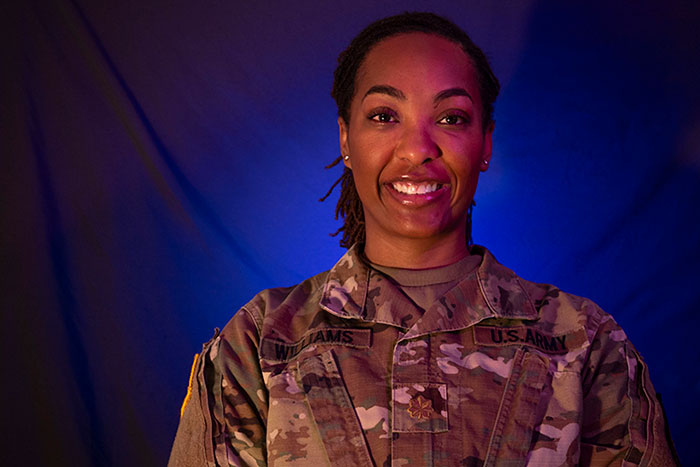Army nurse finds personal, professional fulfillment with medical development team

Women have a rich history in the U.S. military since before the nation's founding. During Women's History Month, we are highlighting women across the U.S. Army Medical Materiel Development Activity (USAMMDA) and the contributions they make each day to the Army's medical development and sustainment missions.
For Maj. Felicia Williams, the decision to join the U.S. Army was an easy one. Surrounded by a supportive family in South Carolina, Williams was inspired as a child by the military service of her father and uncle, whose disciplined lifestyle and sense of purpose resonated with her.
"My parents and younger brother provided unwavering support and guidance that have been instrumental in helping me navigate life's challenges," said Williams, who has served for the past 18 months as a nurse consultant with the U.S. Army Medical Materiel Development Activity at Fort Detrick, Maryland. "The military's offering of benefits, diverse training, and travel opportunities further solidified my decision."
Her two-decade military journey, which began with the National Guard in Florida, includes serving at Fort Liberty, North Carolina; Walter Reed Army Medical Center, Washington, D.C.; 121st General Hospital, Yongsan, Korea; Joint Base San Antonio, Texas; and West Point, New York. Each duty station, she says, provided her with invaluable experiences and opportunities for personal and professional growth.
Along the way, Williams studied nursing, obtaining various degrees and certifications that have enriched her career. And while it may seem a bit unusual for a surgical nurse to be involved in USAMMDA's medical logistics and acquisition mission, Williams finds her role deeply satisfying.
"Working in Army medical development allows me to contribute to ensuring that our Warfighters have access to critical medical supplies and equipment, ultimately saving lives in combat situations," Williams said. "I feel that I am contributing to a cause greater than myself, particularly in supporting the logistical aspects of medical care outside of traditional hospital settings. This role excites me, as it aligns with my passion for making a meaningful impact."
That impact extends far beyond her duties as a clinician who holds the perioperative nurse military occupational specialty. Williams also serves as a SHARP Victim Advocate at USAMMDA, supporting the Army's Sexual Harassment/Assault Response and Prevention Program.
SHARP advocates provide essential care and support to victims, including non-clinical information on available options and resources, according to program experts. SHARP advocates also maintain contact with victims as needed for continued support. Their goal is to assist victims in making informed decisions as they progress through resolution and healing.
As an officer who approaches her duties with compassion and understanding, Williams is a natural fit for the role of SHARP Victim Advocate.
"I believe in the importance of treating everyone with dignity and respect," she says. "This approach not only fosters a positive work environment, but also enhances team morale and productivity. I am deeply committed to my role in the Army and am dedicated to fostering a culture of diversity, respect, and excellence in all aspects of my service."
According to demographic information compiled annually by the Department of Defense, the percentage of women in the U.S. Armed Services has continued to rise. As of November 2023, women comprised 17.5 percent of the active-duty force and 21.6 percent of the selected reserve.
Williams believes that having strong women leaders in military organizations enhances diversity of thought and perspective, and ultimately leads to more well-rounded decision-making processes. She says this diversity of perspective is crucial for addressing the complex challenges military organizations face today.
"In my opinion, it is essential to have strong women leaders in key positions in the Army who bring diverse viewpoints and experiences to the table," she says. "This diversity enhances the organization's overall effectiveness and adaptability in responding to evolving challenges."
Despite those challenges, Williams says, the Army can provide a path for young women to obtain unparalleled leadership training and experience that far surpasses their civilian sector peers.
"I believe that my experiences as a female leader can inspire young women to explore opportunities in the Army," she added. "By showcasing diverse leadership styles and backgrounds, I aim to demonstrate that anything is possible with determination and hard work."













